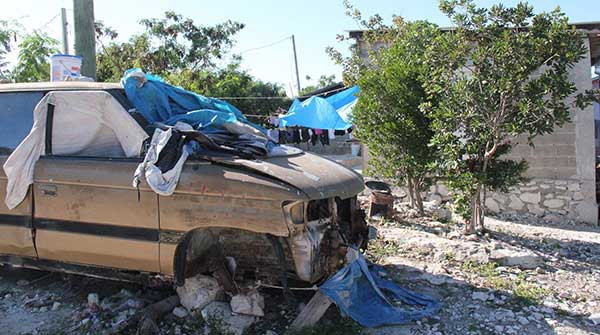Haiti’s efforts toward self-determination have been almost constantly undermined by foreign intervention
 The Indian writer Anurag Shourie stated, “A half-truth is even more dangerous than a lie.” This concept is vital to grasp if we want to find solutions to the world’s problems.
The Indian writer Anurag Shourie stated, “A half-truth is even more dangerous than a lie.” This concept is vital to grasp if we want to find solutions to the world’s problems.
We begin with the things we know to be true. We then question things that may or may not be true, as well as the motivation of people giving us this information. We are thus able to sift out the truth from the lies as much as possible. From there, we can begin to move forward in a way that is beneficial to future generations, all the while continuing to seek truth and correcting our mistakes.
This is not an easy task, and it is made more difficult by media sources – left, right and centrist – that have a dishonest agenda, whether financial or ideological.
Many of us, for example, do not understand why Haiti, the second country in the Americas to cast out its European colonizer, remains so desperately poor and so politically unstable. What undeniable truths do we know about this country?
 An abandoned car serves as home to Haitian workers |
| Related Stories |
| The Congo’s great liberation turned into abject failure
|
| Barbados shakes off the chains of centuries of brutal oppression
|
| Shaking off colonial shackles no easy task
|
First, it was once known as Saint-Domingue, a source of tremendous wealth for the French Empire. This wealth was generated on the backs of people kidnapped from Africa to work on sugar plantations. The population unified under the leadership of Toussaint Louverture, and they accomplished the largest slave revolt in history and established the country of Haiti in 1804.
The French were not pleased to lose this source of wealth. They returned with warships in 1825 and extorted a payment of 150 million francs (roughly US$20 to US$30 billion in today’s currency) if Haiti was to avoid being invaded. The last of these crippling payments was made in the 1940s.
Haiti has also had to deal with other foreign interference. The United States, for example, sent an invasion force to the capital Port-au-Prince in 1915 after bankers convinced U.S. President Woodrow Wilson that this was necessary to defend their interests. Haitian resistance to the occupation was constant, but the forces remained in place until U.S. President Franklin Roosevelt withdrew them in 1934.
Haitian efforts toward self-determination have been almost constantly undermined by foreign intervention. For example, the democratically elected and hugely popular Haitian President Jean-Bertrand Aristide was put on a plane and flown into exile by the U.S. (with support from France and Canada) after he dared to mention the possibility of reparations for the above-mentioned money extorted by France.
The image of Haiti presented in most Western media is one of gang violence, and there are again calls for a foreign invasion force. We are not told that the Haitians themselves are very proud people and continue to produce leaders who embrace the spirit of Toussaint Louverture.
Former police officer Jimmy Chérizier, for example, has organized much of Port-au-Prince to keep people fed and protected despite the lawlessness that reigns in the city. We also know that Chérizier has many enemies who have no issue slandering him.
Data shows that there is tremendous disparity in income distribution in Haiti, so we can safely assume that there is a small group of people benefiting from the chaos while the vast majority of Haitians live in desperate poverty.
This is just a small sampling of what we know to be true about Haiti, but it does not provide any solutions. Experience in other countries (for example, Western Europe in the late 1940s and 1950s) demonstrates that indigenous leadership, combined with foreign aid in health care, infrastructure, and education, as well as business investments providing well-paying jobs, will result in political stability and economic growth.
Haiti is poor and unstable because Western powers have made it that way. Foreign military intervention has never made life better for ordinary Haitians. Any attempt to deny these facts is either a half-truth or an outright lie.
Gerry Chidiac specializes in languages, genocide studies and works with at-risk students. He is the recipient of an award from the Vancouver Holocaust Education Centre for excellence in teaching about the Holocaust.
For interview requests, click here.
The opinions expressed by our columnists and contributors are theirs alone and do not inherently or expressly reflect the views of our publication.
© Troy Media
Troy Media is an editorial content provider to media outlets and its own hosted community news outlets across Canada.

